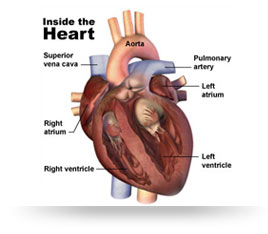
Aortic valve regurgitation — or aortic regurgitation — is a condition that occurs when your heart's aortic valve doesn't close tightly. Aortic valve regurgitation allows some of the blood that was just pumped out of your heart's main pumping chamber (left ventricle) to leak back into it.
The leakage of blood may prevent your heart from efficiently pumping blood out to the rest of your body. As a result, you may feel fatigued and short of breath.
Aortic valve regurgitation can develop suddenly or over decades. Aortic valve regurgitation has a variety of causes, ranging from congenital heart defects to complications of infectious illnesses. Once aortic valve regurgitation becomes severe, surgery is usually required to repair or replace the aortic valve.
Aortic valve regurgitation disrupts the way blood normally flows through your heart and its valves.
Your heart, the center of your circulatory system, consists of four chambers. The two upper chambers, the atria, receive blood. The two lower chambers, the ventricles, pump blood to your lungs and to the rest of your body. Blood flows through your heart's chambers, aided by four heart valves.
The aortic valve consists of three tightly fitting, triangular-shaped flaps of tissues called leaflets. These leaflets connect to the aorta through a ring called the annulus.
Heart valves open like a one-way gate. The leaflets of the aortic valve are forced open as the left ventricle contracts and blood flows into the aorta. When all of the blood has gone through the valve and the left ventricle has relaxed, the leaflets swing closed to prevent the blood that has just passed into the aorta from flowing back into the left ventricle.
A defective heart valve is one that fails to either open or close fully. When a valve doesn't close tightly, blood can leak backward. This backward flow through a valve is called regurgitation.
Numerous causes
Any condition that damages a valve can cause regurgitation. Causes of aortic valve regurgitation may be:
- A congenital heart defect. You may have been born with an aortic valve that has one leaflet (unicuspid valve) or two leaflets (bicuspid valve) rather than the normal three leaflets. This puts you at risk of developing aortic valve regurgitation at some time in your life.
- Deterioration of the valve with age. The aortic valve opens and shuts tens of thousands of times a day, every day of your life. Aortic valve regurgitation may result from age-related wear and tear on the valve.
- Endocarditis. The aortic valve may be damaged by endocarditis — an infection inside your heart that involves heart valves.
- Rheumatic fever. Rheumatic fever — a complication of strep throat and once a common childhood illness in the United States — can damage the aortic valve, leading to aortic valve regurgitation later in life. Rheumatic fever may damage more than one heart valve, and in more than one way. A damaged heart valve may not open fully or close completely — or both. Rheumatic fever is still prevalent in developing countries, and many older adults in the United States were exposed to rheumatic fever as children.
- Other causes. Other, rarer conditions that can damage the aortic valve and lead to regurgitation include Marfan syndrome (a disease of connective tissue), ankylosing spondylitis (a spine disorder) and syphilis (a sexually transmitted disease). Damage to the aorta near the site of the aortic valve, such as damage from injury to your chest or from a tear in the aorta, also can cause backward flow of blood through the valve.
Aortic valve regurgitation — of any cause — can weaken your heart. In aortic valve regurgitation, some blood leaks back into the left ventricle instead of flowing onward to the rest of your body after being pumped into the aorta. This forces the left ventricle to hold more blood. In response, this chamber of your heart may enlarge and thicken. At first these adaptations help the left ventricle pump blood with more force. But eventually these changes weaken the left ventricle — and your heart overall.

